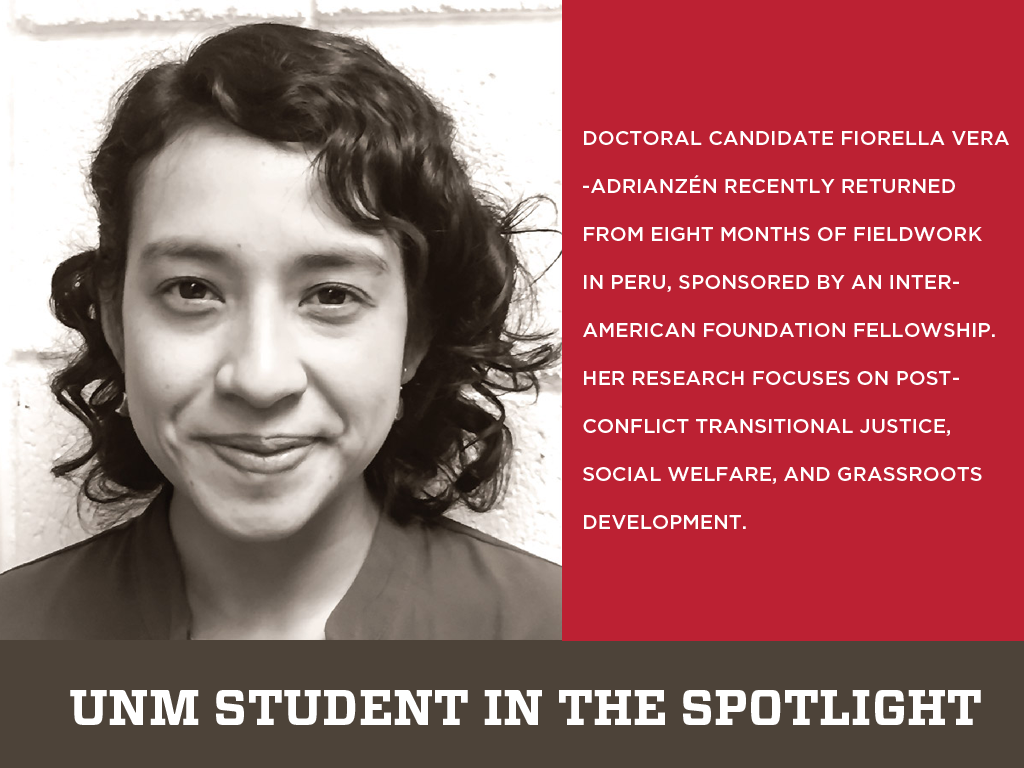LAII PhD Fellow Fiorella Vera-Adrianzén Featured by Office of Graduate Studies
November 27, 2017

The UNM Office of Graduate Studies recently featured LAII PhD Fellow Fiorella Vera-Adrianzén. Below is their full spotlight about Fiorella and her time as an Inter-American Foundation Grassroots Development Fellow.
UNM Doctoral Candidate Conducted Fieldwork in Peru through IAF
Fall is just breaking with crisp mornings and unpredictable skies. This particular morning the sun was bright, causing the raindrops to glisten on the chairs and table near the Student Union Building, when Fiorella Vera-Adrianzén bustled in with a busy schedule for the day ahead. “I have just returned here from 8 months in the field” she said, “and it is taking some time to get adjusted back to being here.” Her research focuses on post-conflict transitional justice in Latin America, as well as social welfare and grassroots development in the region. Her dissertation examines the efficacy of reparations at the individual and community levels in post-conflict Peru, which is where she was conducting fieldwork with the support of an Inter-American Foundation Grassroots Development Fellowship.
Fiorella was born and raised in Peru (Lima) where she went to Law School (an undergraduate program at the Pontifical Catholic University of Peru). After coming to the US, she attended UNM both as a McNair-ROP scholar and Honor’s program undergrad student and was summa cum laude for her B.A. in political science in 2010. She completed the M.A. in 2015 and is now a Political Science Ph.D. candidate at UNM. Her subfields of study are comparative and international politics – with focus on transition justice and human rights in Latin America. She gained Quechua language skills through her education in Peru and in the U.S. and participated in a cultural immersion and intensive Kichwa language training in Ecuador, as a Foreign Language and Area Studies Fellow. She is employing her robust research interests and language abilities to implement a dissertation project that contributes to the study and implementation of transitional justice in Peru and other countries experiencing similar post-conflict scenarios.
Her dissertation examines the efficacy of reparations for victims of the civil conflict in Peru (1980-2000) between Maoist insurgent groups (i.e. Shining Path) and state forces. The reparations program aims to provide justice and post-conflict reconstruction to disenfranchised indigenous communities, who were disproportionately affected by the conflict (80% of the victims were living in rural areas and 75% spoke Quechua or other indigenous language), through collective, individual, material, and symbolic reparations. Since 2007, collective reparations, one of the seven programs, have been provided to affected rural communities and organizations of displaced victims. However, only in the last few years, the other programs (i.e. education, health, housing, civil and political rights, monetary, and symbolic reparations) have gained traction. Across all these programs, for many individuals and communities affected by the conflict, “reparations should compensate them for the rights and life opportunities they lost or never had access to due to the violence they endured, recognizing them as human beings and citizens with full rights.”
Fiorella’s research will result in a template or framework by which reparation programs can proceed in Peru and other countries implementing reparative justice. Her approach is strongly composed of grassroots input and design and employs Quechua cultural and linguistic lenses. Fiorella returned from 8 months in the field – supported by the IAF fellowship – carrying out ethnographic work in Junín, Apurímac, and (mainly) Ayacucho regions and collecting initial survey data. She will return to the field to complete the survey in several provinces of Ayacucho and employ FH funding to support in-depth ethnographic work (focus groups, participant observation, and interviews) in selected case-study communities in Ayacucho, the most affected region by the conflict. She anticipates finishing her degree in May 2019. After that, Fiorella wants to continue research as an applied researcher and work towards fueling policy development in the areas of justice and grassroots development in order to improve peace-building, conflict management, democracy and human rights in Latin America and elsewhere in the world.
